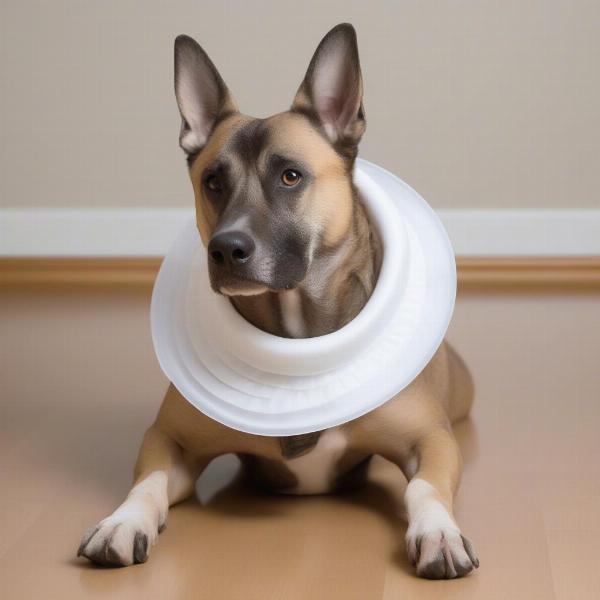Urethral prolapse in dogs, a condition where the inner lining of the urethra protrudes through the urethral opening, can be a concerning sight for any pet owner. This article will delve into the causes, symptoms, and treatment options for this condition, providing you with the information you need to ensure your canine companion receives the best possible care.
Understanding Urethral Prolapse in Dogs
Urethral prolapse occurs most commonly in intact male dogs, particularly brachycephalic breeds like English Bulldogs and French Bulldogs. While less frequent, it can also affect female dogs. The prolapse appears as a reddish, moist mass at the tip of the penis or vulva. This sensitive tissue is prone to bleeding and infection, making prompt veterinary attention crucial.
Hormonal influences are suspected to play a role in male dogs, as the condition is often seen in sexually mature, unneutered individuals. In female dogs, straining during urination or defecation, urinary tract infections, and hormonal imbalances can contribute to the prolapse.
Recognizing the Symptoms of Urethral Prolapse
The most obvious symptom is the visible protrusion of the urethra. This can range from a small, pink bump to a larger, more inflamed mass. Other signs include:
- Frequent licking of the genital area
- Blood in the urine or dripping from the penis/vulva
- Difficulty urinating
- Straining to urinate
- Discomfort or pain when urinating
Diagnosis and Treatment Options for Urethral Prolapse
If you suspect your dog has a urethral prolapse, immediate veterinary consultation is essential. The veterinarian will perform a physical examination and may recommend additional tests to rule out other conditions and determine the extent of the prolapse.
Treatment options vary depending on the severity of the prolapse and the underlying cause. For minor cases, medical management may be sufficient. This can include antibiotics to prevent infection, anti-inflammatory medications to reduce swelling, and topical creams to protect the exposed tissue. prolapsed urethra in dogs
In more severe cases, or if medical management is unsuccessful, surgical intervention is often necessary. Surgical options include:
-
Resection and anastomosis: The prolapsed tissue is removed, and the healthy urethra is sutured back together.
-
Urethrostomy: A new opening is created for urination, bypassing the affected area.
-
Castration (for male dogs): This is often recommended to prevent recurrence, especially in hormone-driven cases.
Post-Operative Care and Prevention
Post-operative care typically involves keeping the area clean and dry, administering medications as prescribed, and using an Elizabethan collar to prevent licking or chewing.
 Chó đeo vòng cổ chữ E sau phẫu thuật
Chó đeo vòng cổ chữ E sau phẫu thuật
While not always preventable, neutering male dogs can significantly reduce the risk of urethral prolapse. Maintaining good hygiene, addressing urinary tract infections promptly, and managing underlying health conditions can also help minimize the likelihood of this condition in female dogs.
Conclusion
Urethral prolapse in dogs is a serious condition that requires prompt veterinary attention. Recognizing the symptoms early and seeking professional help can greatly improve the outcome for your furry friend. With appropriate treatment and care, most dogs make a full recovery and can enjoy a healthy, comfortable life. urethral prolapse in male dogs
FAQs
- Is urethral prolapse painful for dogs? Yes, it can be painful and uncomfortable, especially when urinating.
- Can female dogs get urethral prolapse? Yes, although it’s less common than in males.
- Is surgery always necessary? Not always. Mild cases may respond to medical management.
- What is the recovery time after surgery? Recovery time varies but is typically a few weeks.
- Can urethral prolapse reoccur? Yes, especially if the underlying cause isn’t addressed.
ILM Dog is a leading online resource for dog owners worldwide, offering expert advice on all aspects of canine care. We provide comprehensive information on dog breeds, health, training, nutrition, grooming, and much more. Our mission is to empower dog owners with the knowledge they need to provide their beloved companions with the best possible care. For further information or personalized advice, please contact us via email at [email protected] or call us at +44 20-3965-8624. ILM Dog is committed to providing the most up-to-date and reliable information on dog health and well-being.